UN Secretary-General observes the impact of climate change in Kiribati
From 4 to 5 September 2011, the UN Secretary-General Ban Ki-Moon made an official visit to the Republic of Kiribati in the Pacific to observe the direct impact of climate change.
Aerial view of the main island of Tarawa
The United Nations Secretary-General Ban Ki-Moon lists combatting global climate change as one of the corner stones of his second term action agenda. In September 2011, he made a two-day official visit to the Republic of Kiribati, one of the world’s most isolated countries, to observe the direct impact of climate change on this tiny island nation which just over 100,000 people call home. Kiribati consists of 33 atolls spreading over the Pacific along the equator with a total land area of 811㎡. The highest elevation of the capital Tarawa is mere 3 meters.
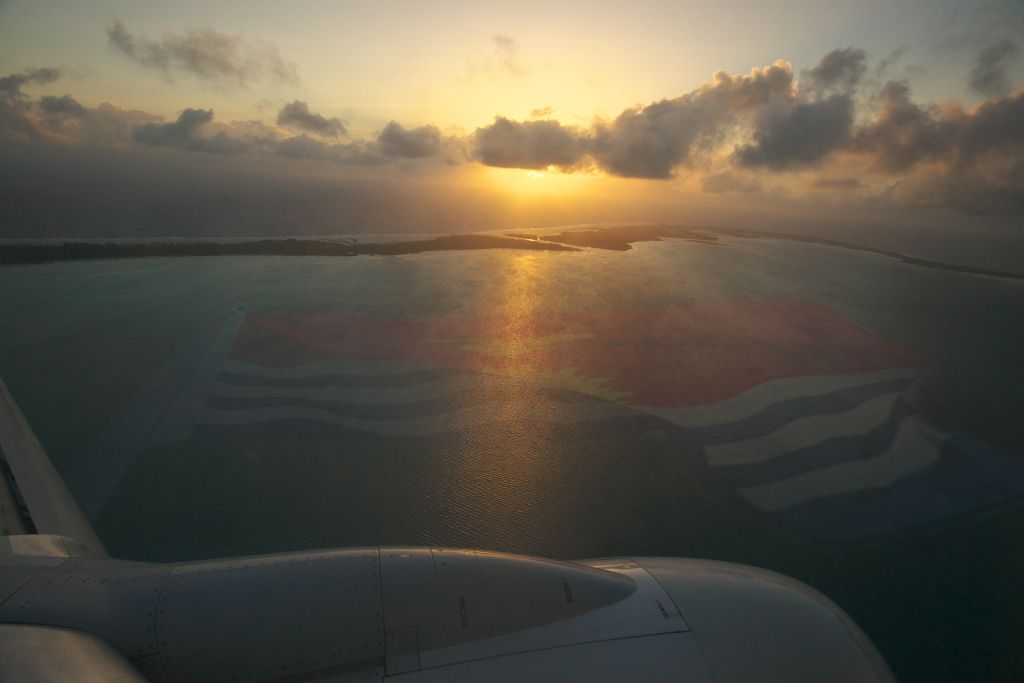
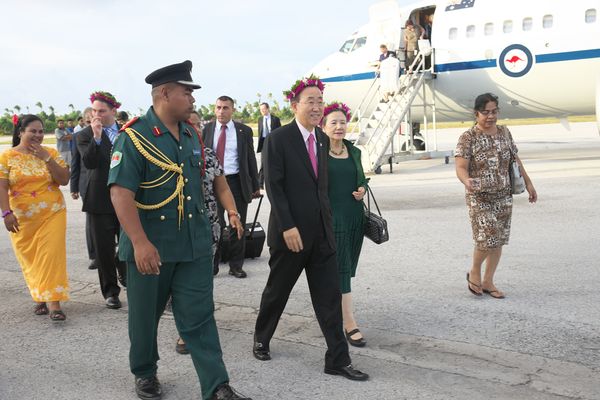
The UN Secretary-General Ban Ki-Moon and Mrs. Ban arrive.
Bairiki International Airport at Tarawa, Republic of Kiribati.
The highway (the sole road network) cutting cross the Tarawa Island.
The highway (the sole road network) cutting cross the Tarawa Island. During ‘king tide’ or storms, the road becomes impassable. The President of Kiribati, Honorable Mr. Anote Tong, has stated that the total submergence of the country is no longer avoidable and has announced a plan to relocate its entire population to third countries.
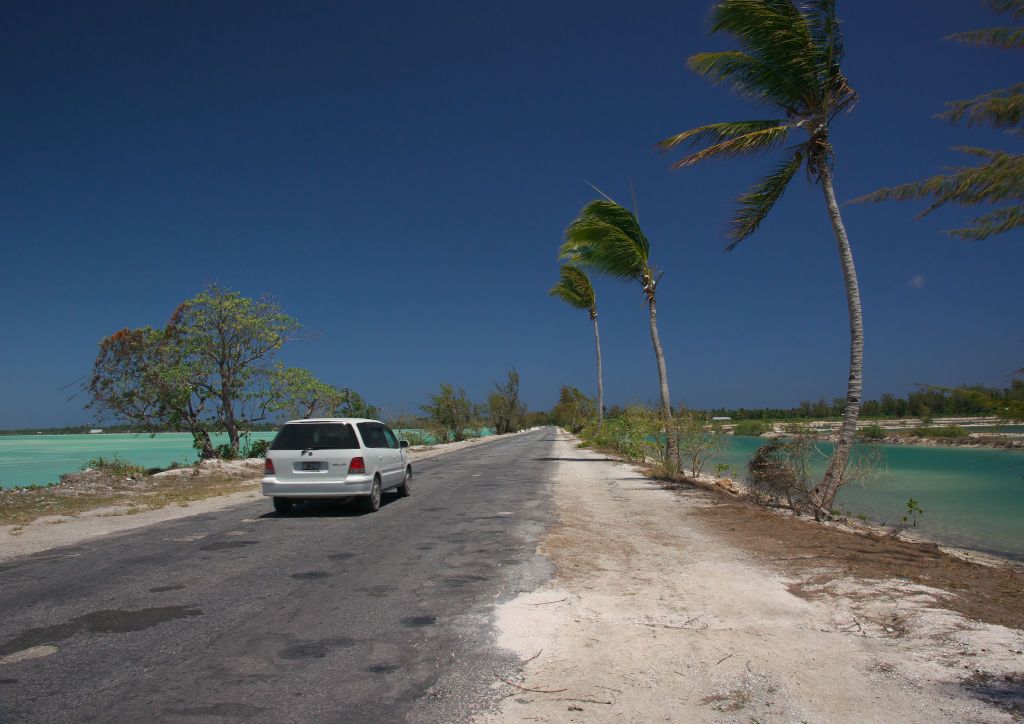
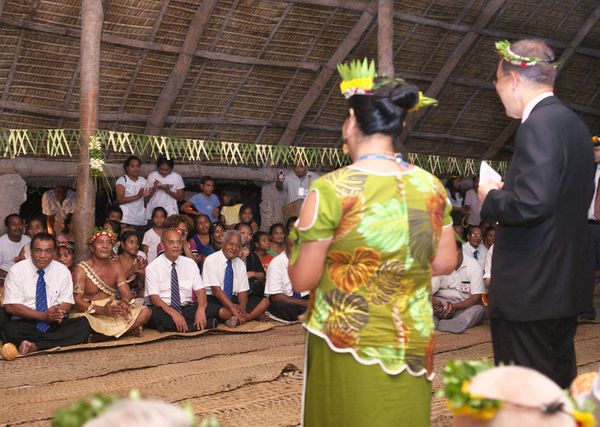
Meeting the tranditional leaders.
After a brief rest, the UN Secretary-General proceeded to Maneaba (traditional community meeting place) to meet the elders who have strong influence over the nation’s social issues. After a traditional welcome ceremony, Mr. Ban addressed the elders: 'We are both concerned about climate change. I hope by coming here ... I can call (global) attention to this urgent problem. Many countries are dealing with climate change but here climate change is threatening your territory, your culture, your very way of life.'
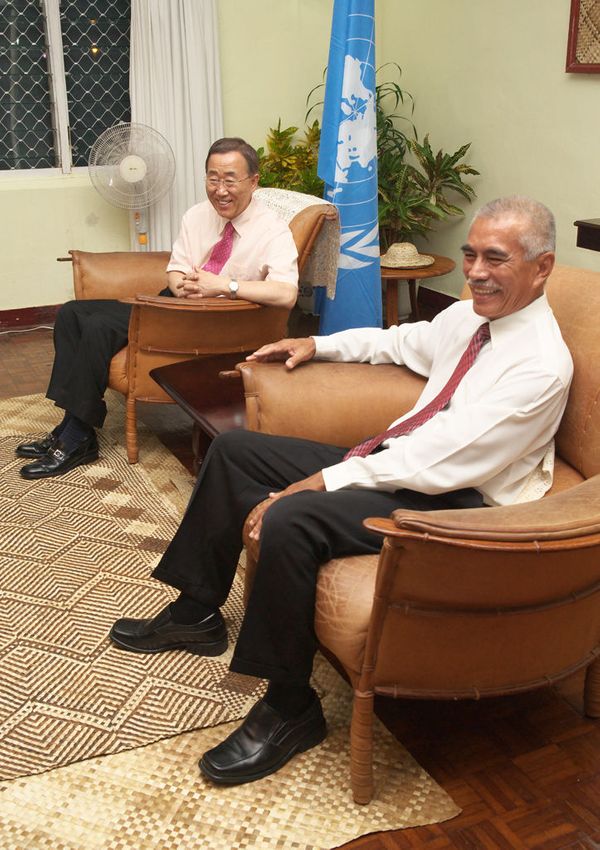
Meeting with the President of the Republic of Kiribati.
The UNSG then met President Anote Tong at State House. President Tong has been actively raising awareness of the challenges his nation is facing on the world stage. Speaking before the state dinner, Mr. Ban mentioned, 'We have to protect our world so that our children and grandchildren never have to wonder how we could have been so irresponsible. Our only choice is to act now.'
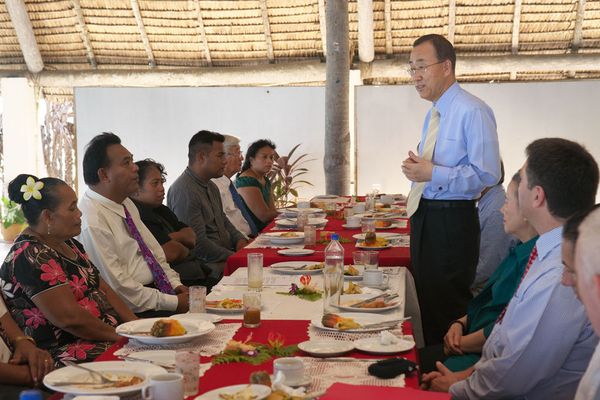
Breakfast discussion with Karibati Environment Minister.
The second day of the UN Secretary-General's visit started with a breakfast meeting with the Minister of Environment, Lands and Agricultural Development (MELAD) Mr. Amberoti Nikora (opposite Mr. Ban) who briefed the Secretary-General on how the rising sea level negatively affects the daily life of the Kiribati people. After the meeting, the UN Secretary-General proceeded to some of the most affected communities.
Tebikenikora (Tebikenikoora) Village.
People of Tebikenikora (Tebikenikoora) Village waiting for the arrival of the UN Secretary-General.
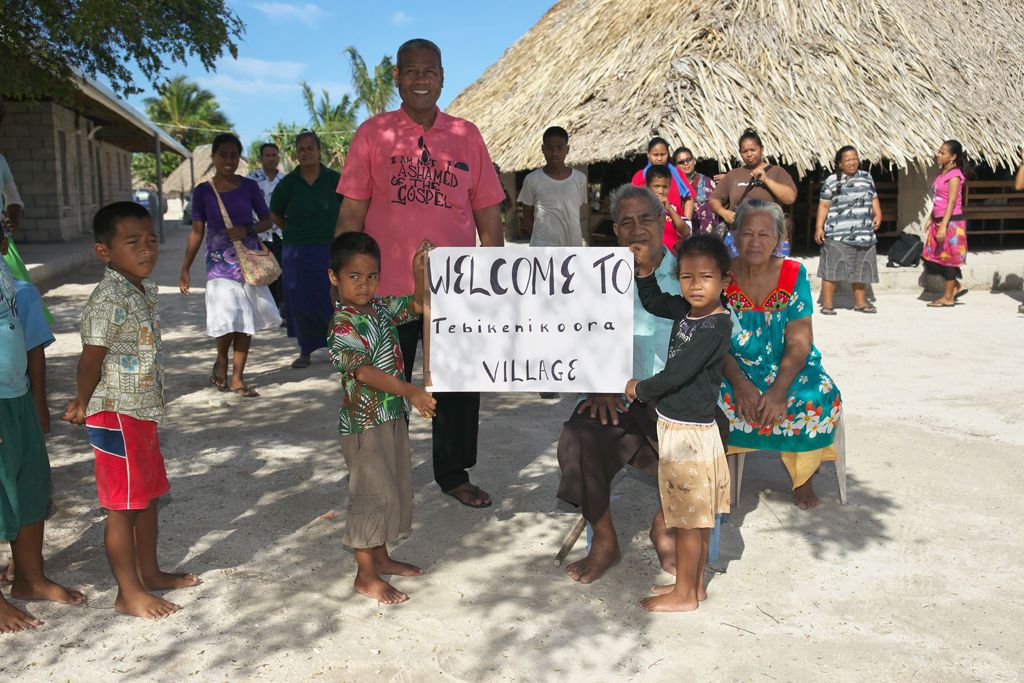
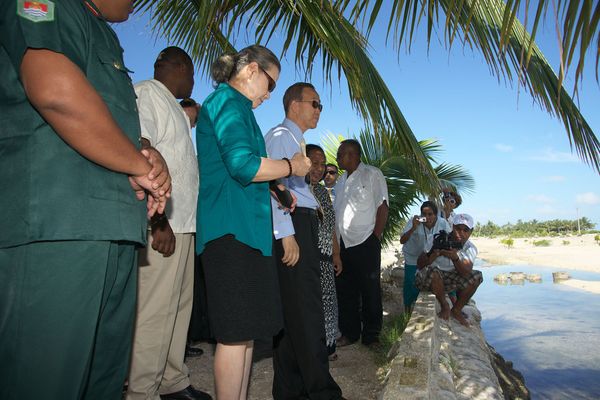
Tebikenikora Village.
The UN Secretary-General surveying degraded land areas at Tebikenikora Village.
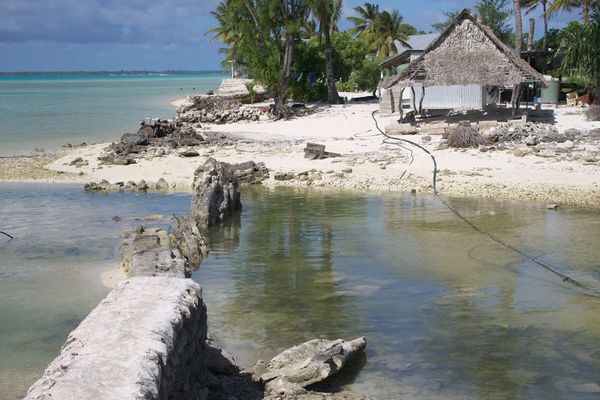
Destroyed seawall at Tebikenikora Village.
Destroyed seawall. Tebikenikora is just one of the villages fighting an uphill battle against the impact of climate change.
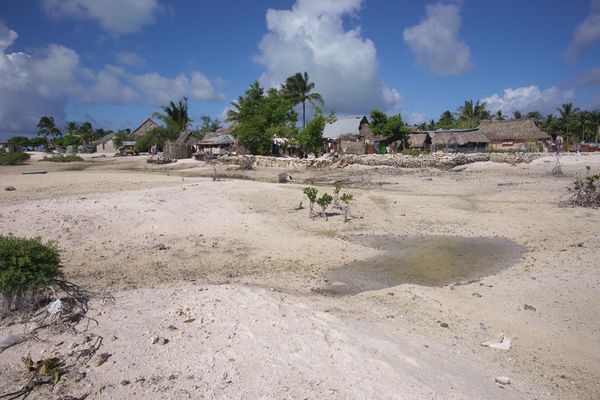
Seawater invasion.
Tebikenikora Village at low tide. Seawater reaches the center of the village during high tide.
'Trees of Life' dying.
Coconut trees, often called 'Tree of Life' among the Pacific islanders. Every part of the tree is used in daily life to provide: coconut meat and milk – nourishment, copra – cooking oil/detergents/soaps, trunks - construction materials, husks - fuels/tinder and leaves/shells - handicraft materials (handicraft making is one of the main industries of the country). They are now dying in many places due to salinization of the soil. It is also destroying the country’s meager crop-growing lands and precious freshwater sources.
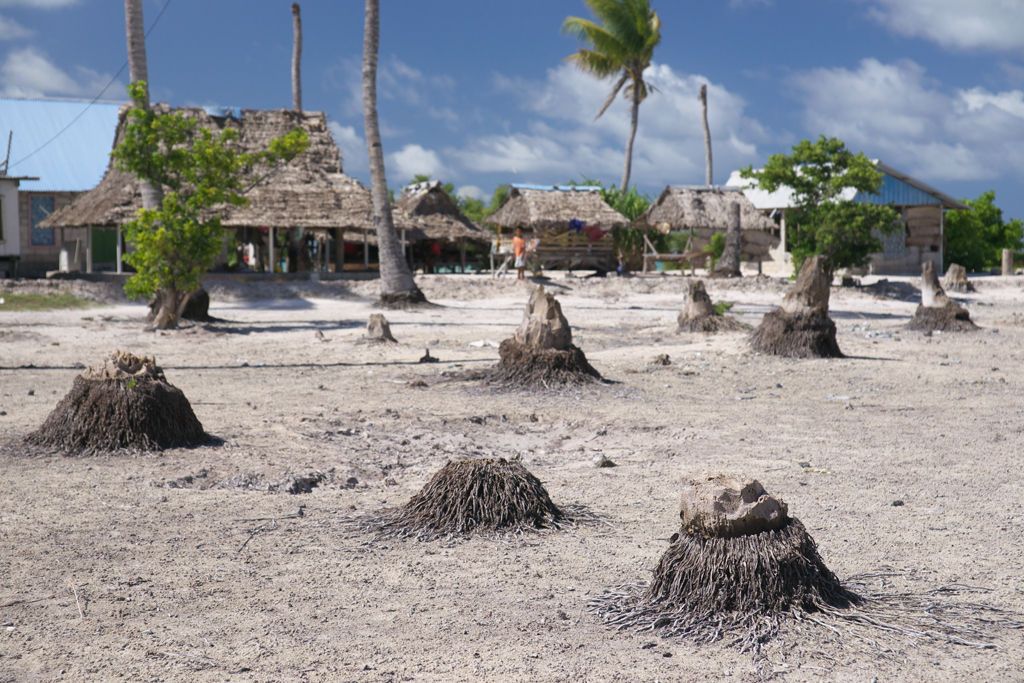
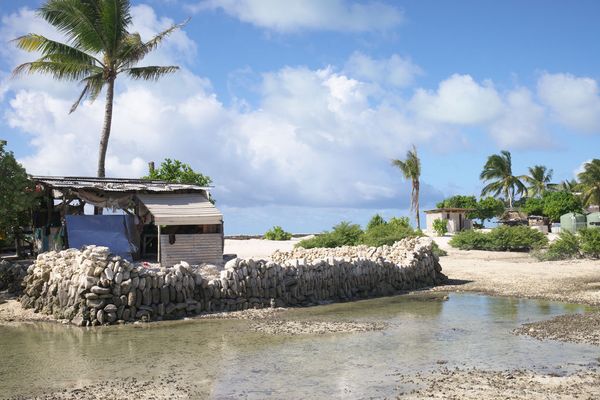
Seawater invasion.
Some houses become partly submerged during high tides but residents have nowhere else to go. How much longer can they hang on?
Home gone.
Home gone. Mr. Kaure Paoro worries for the future of the nation. A former resident of Kabintemaiku Village which no longer exists, he was forced to relocate to nearby settlement after the village became inhabitable in the aftermath of a 2001 storm. As a child, he used to see the seashore some 100 meters away from the village.
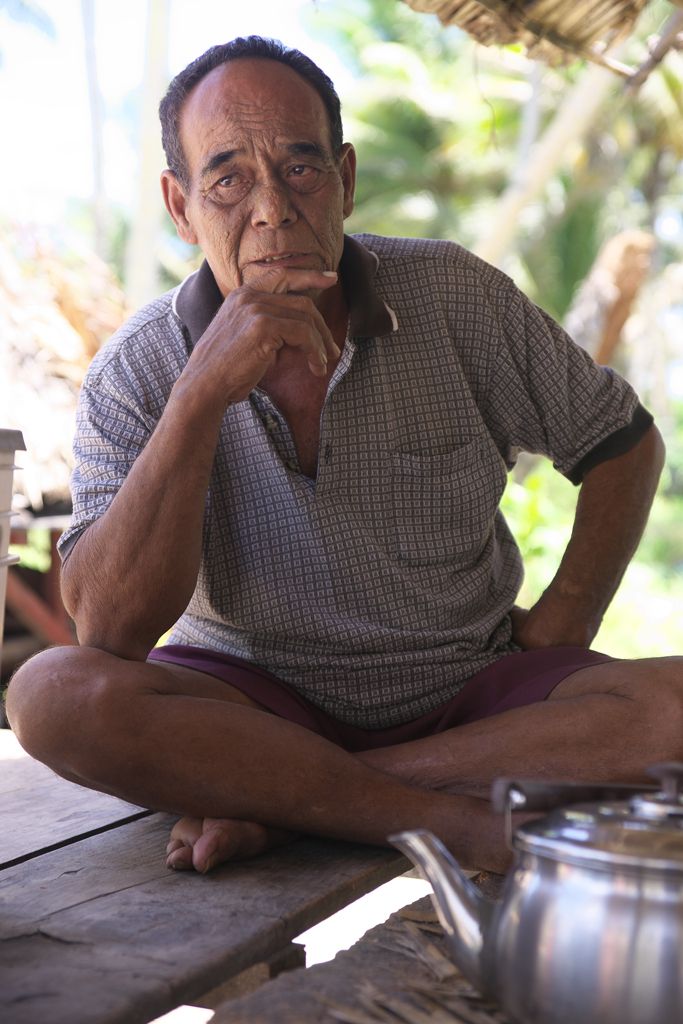
The legacy of a lost village.
What is left of an old seawall. Residents had to abandon Kabintemaiku Village in 2001. The area was completely washed out by 2003.
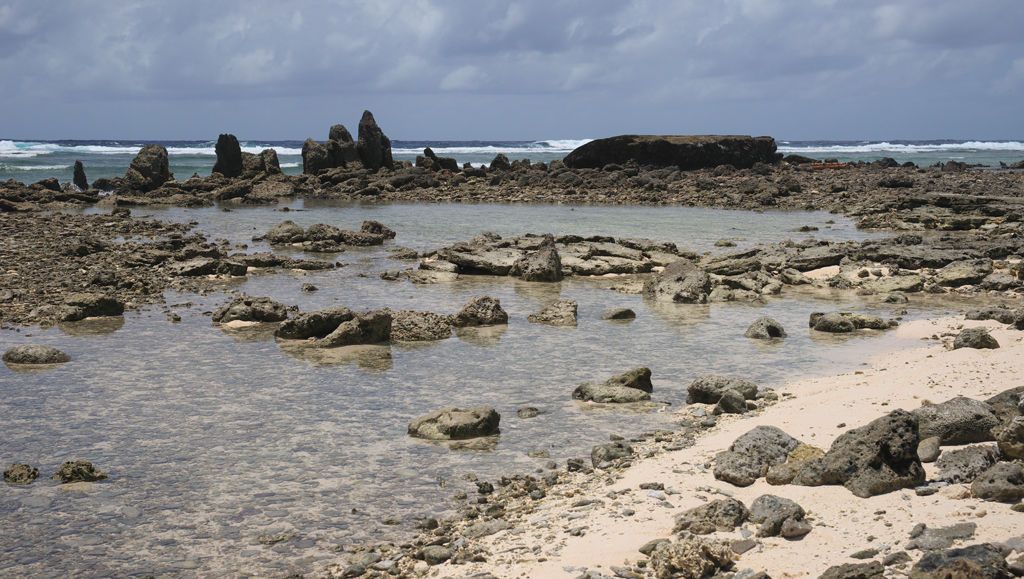
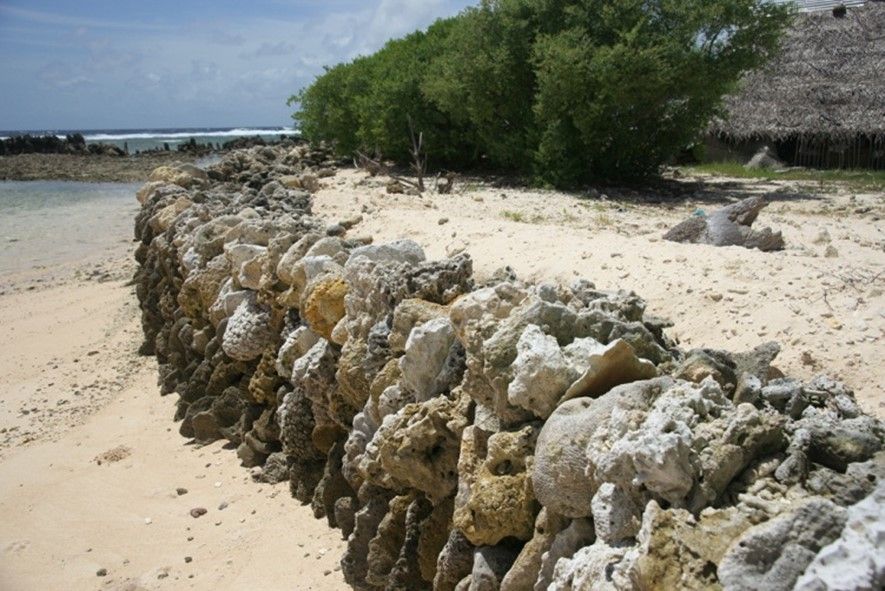
The last defense.
Last defense against sea water invasion. Seawater swallows the walls during a storm.
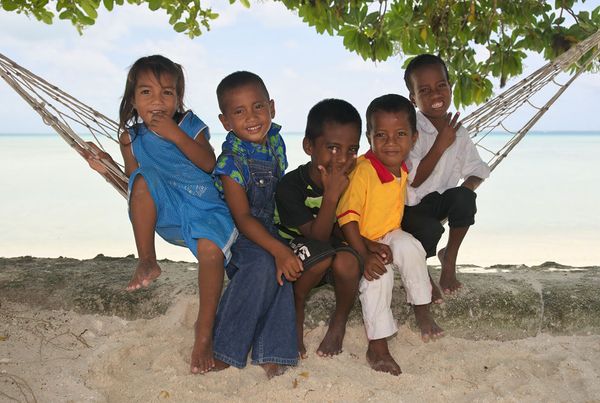
Innocent and optimistic.
The children of the Tebikenikora Village. During an earlier community meeting, a tearful young student appealed to the Secretary-General: ‘I cannot sleep at night worrying that the sea water might destroy my house and take me away. What will happen to me?’ What can the rest of the world do to protect their (our) future?
The highest point of Tarawa at 3 meters.
The UN Secretary-General and the Minister of Environment, Lands and Agricultural Development at the highest (3 meters) point of Tarawa.
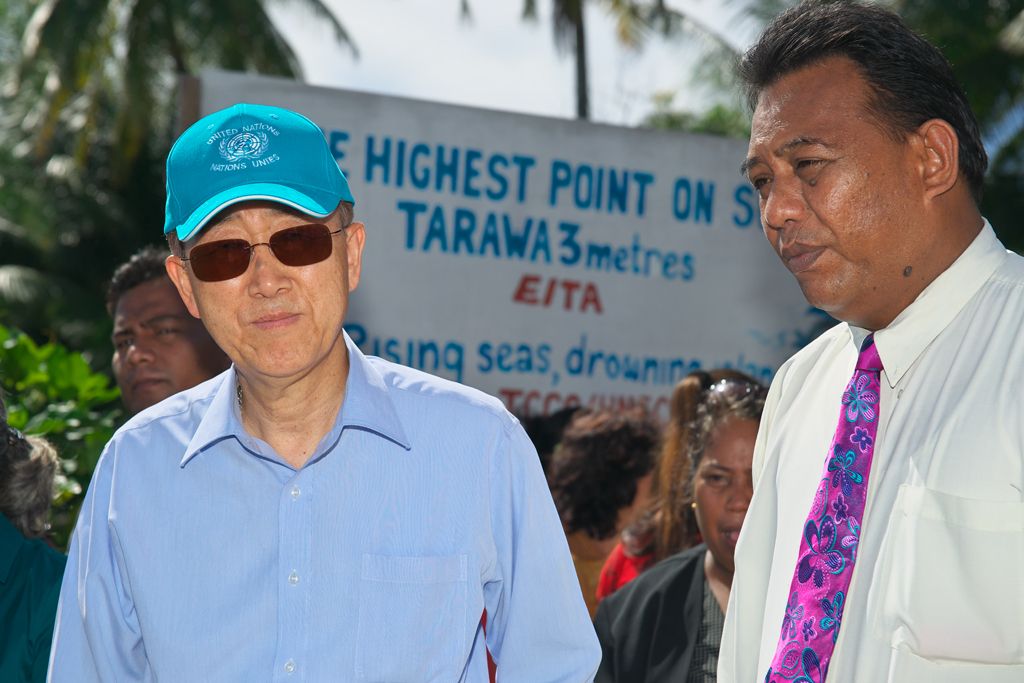
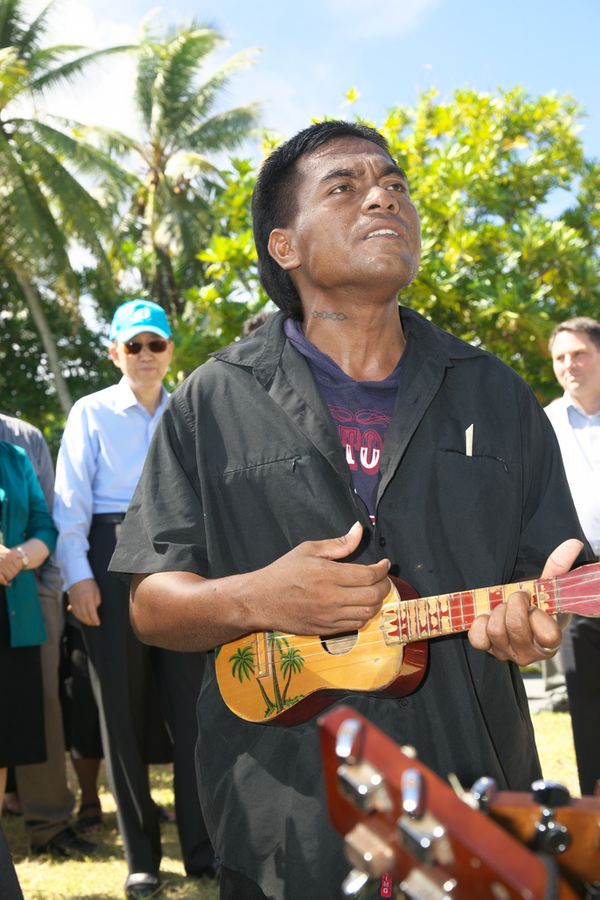
Delivering a message on climate change.
A local youth group delivering a climate change message with a song. The cruel irony of climate change is that those countries less responsible for climate change are paying a higher price. Kiribati contributes minuscule 0.0002% to the total global carbon emissions.
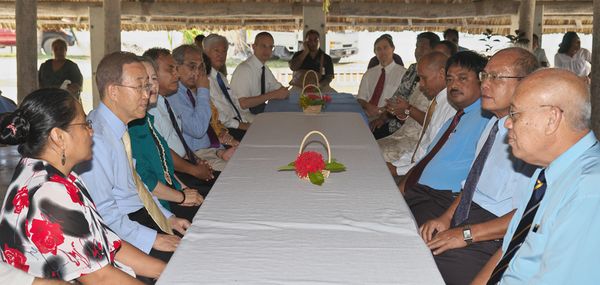
Meeting with Kiribati Members of Parliament.
The UN Secretary-General and Members of Parliament exchanging their views on climate change at Maneaba-n-Maungatabu (House of Parliament).
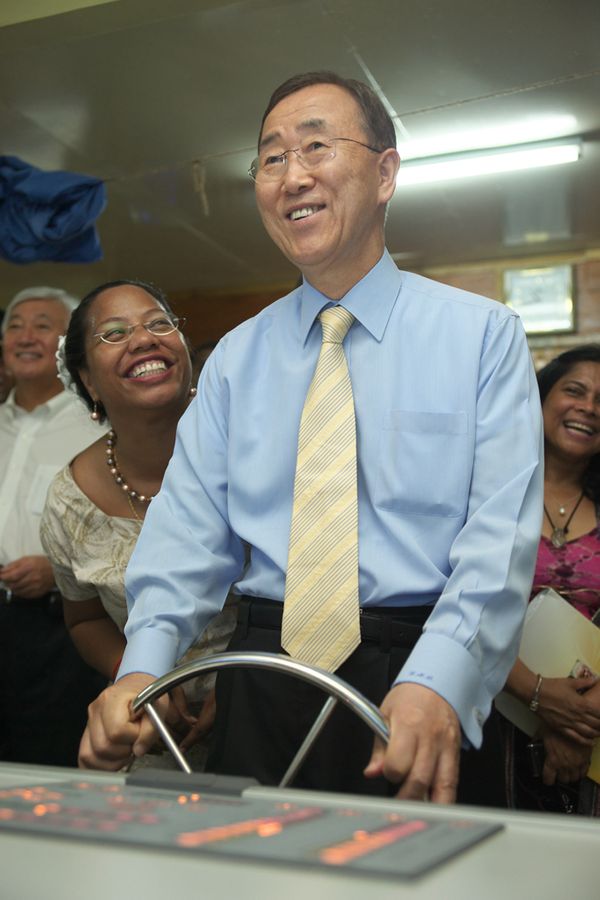
Navigating through the waves of climate change.
Navigating through the waves of climate change - The UN Secretary-General trying his hand at a ship simulator at Marine Training Center.
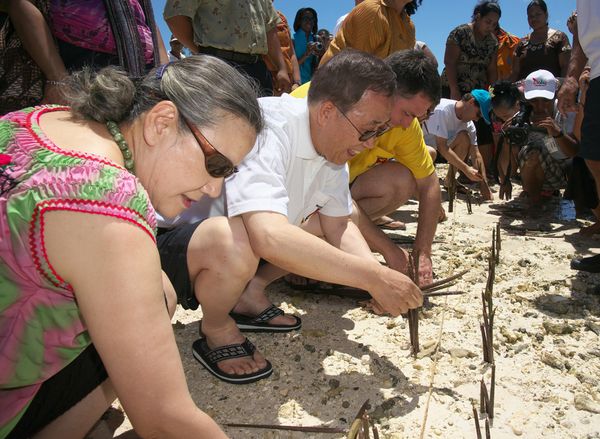
Mangrove planting.
The UNSG and Mrs. Ban planting mangrove in support of ongoing national campaign for coastal protection. Government-led campaign promotes planting of mangrove along the coasts of Tarawa. It is one of the effective countermeasures against land erosion, albeit not a permanent solution.
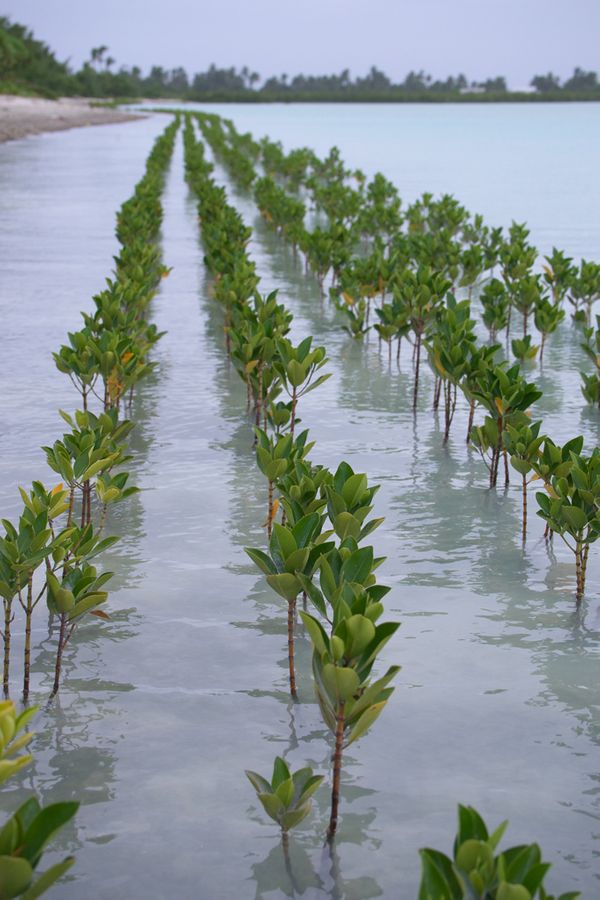
National mangrove planting campaign.
Mangrove planting is considered a ‘soft’ option but also found to be effective. It has an added benefit of promoting marine ecosystems, absorbing nutrients runoffs, and shielding the soil from storm surges
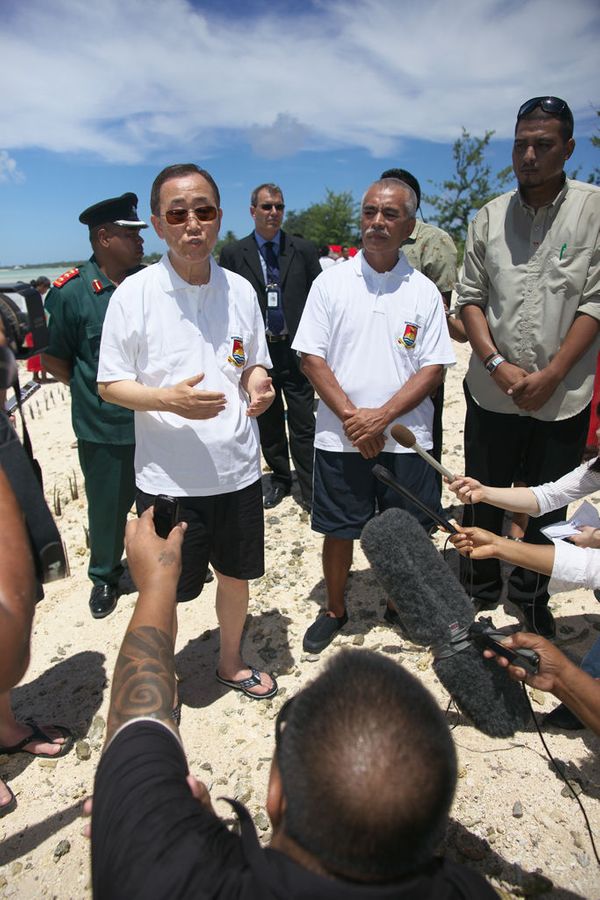
Questions, questions.
The UN Secretary-General and President Tong at press conference after mangrove planting. 'I will bring your concerns back to the world, to the United Nations General Assembly, to the climate change negotiations in Durban later this year and to the Rio20 Conference on Sustainable Development in 2012.'
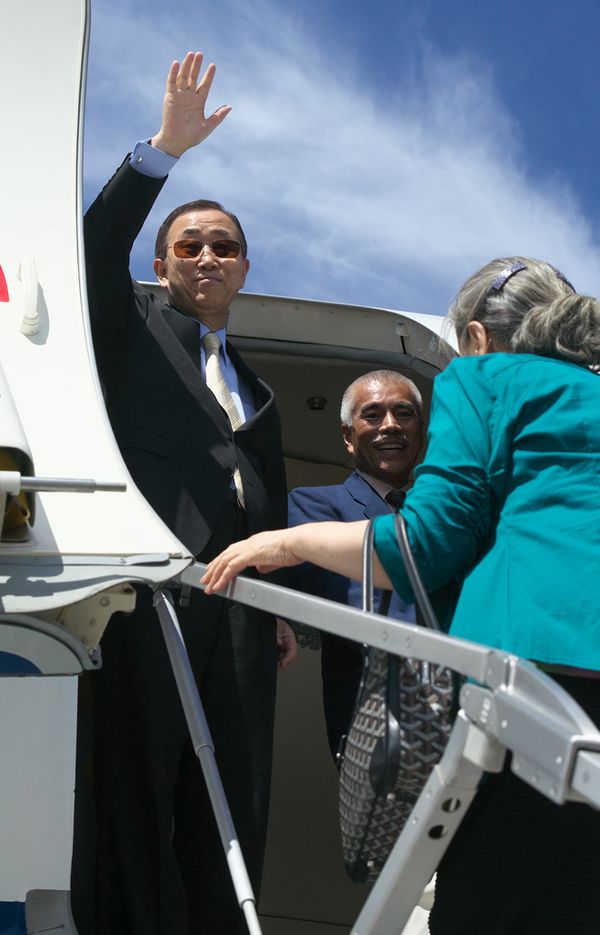
Off to Pacific Islands Forum leaders summit.
The UN Secretary-General bids farewell to the people of Kiribati as President Tong (behind) looks on. 'I will keep pressing for progress until we get real results.' He departed for New Zealand where he presented his observations at the Pacific Islands Forum leaders summit.